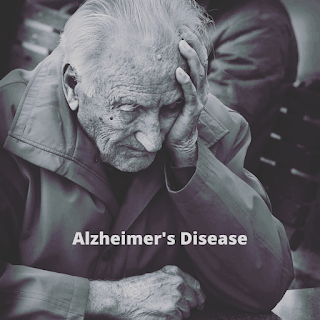Underlining an alarming trend , the World Health organization has recently listed Alzheimer’s disease and other forms of dementia among the top 10 causes of death worldwide. Unfortunately women are being affected far more with Alzheimer’s than men claiming 65% of deaths among women.
The Incidence of Alzheimer’s disease has grown by almost 125% from 2000-2015 all over the world.
According to the Alzheimer’s Association of India ,India already has more than 4 million cases of some form of Dementia and the numbers are growing rapidly.
 |
| Alzheimer’s disease is a leading cause of Dementia |
What is Alzheimer’s disease?
Alzheimer’s disease is an irreversible, progressive type of dementia (mental deterioration) that slowly destroys memory and thinking skills, and eventually, the person loses the ability to carry out the simplest tasks of daily living like reading, writing and conversing.
Alois Alzheimer ,was the German psychiatrist and neuropathologist, who first identified and recorded the symptoms of this disease in a patient, he called it a case of “presenile dementia”. As a credit to Alois Alzheimer, this form of dementia was later termed as Alzheimer’s disease.
DSM 5 has now changed the terminology of Alzheimer’s Disease as “Major or Mild Neurocognitive Disorder Due to Alzheimer’s Disease”
What age group is mostly affected by Alzheimer’s disease ?
Alzheimer’s Disease and Dementia , are they same ?
Dementia is a collective term used to describe a group of symptoms that can impact a person’s ability to think and perform everyday activities independently. Dementia can be of many types- Vascular Dementia, Lewy body Dementia. Alzheimer’s Dementia , Frontotemporal Dementia , Alcohol related Dementia, Parkinson’s disease etc. Alzheimer’s disease is the most common form of dementia with about 70 per cent of total cases,
The symptoms of this disease start showing much later after the brain has already started getting affected. It is only diagnosed later when the symptoms become more prominent. Even then it is not possible to diagnose Alzheimer’s with complete accuracy while a person is alive.
 |
| Depression or irritability is often associated with Alzheimer’s disease |
What are the symptoms of Alzheimer’s Disease?
Alzheimer’s disease sets in gradually with no red flags , here are some key pointers that can help in diagnosing this disease in the early stages. These symptoms should raise the suspicion of dementia and the need for a medical evaluation of the affected person.
Disorientation – Disorientation means an altered mental state , a state of confusion about time, place or events.
Mood and behavioral changes – People with Alzheimer’s may behave in a manner which may seem unlike their normal self , they may get agitated or anxious easily over unimportant matters. They may start staying aloof.
Difficulty using and understanding words – The loss of white matter in the brain can cause symptoms that include trouble finding the right word, losing the thread of conversation when talking, or difficulty understanding the meaning of a regular word. Bilinguals may start forgetting their secondary language and might start reverting back to their native language.
Difficulty swallowing and walking – The gait may be unstable with short shuffling steps or cautious walking. They may even have difficulty in swallowing specially liquids and movement of the tongue may be impaired , Difficulty in swallowing or slower swallowing is often seen in early stages of the disease and hence difficulty in swallowing can be a strong early indicator of Alzheimer’s disease.(Source 1)
In fact, Aspiration Pneumonia ( when food goes the wrong way and reaches the lungs causing Pneumonia) is a leading cause of death in patients with AD.
Changes in personality – Since Alzheimer’s affects the frontal lobe of the cerebral cortex which is responsible for personality, thinking , planning etc. , a person with Alzheimer’s Disease may show changes in their personality over a period of time like change in sexual behavior, depression, lashing out, withdrawal, losing interest in their regular activities or paranoia etc.
Stages of Alzheimer’s Dementia
Predementia – Forgetting things occasionally
Early Dementia – Minor Short Term memory Loss
Middle Dementia – Middle stage dementia is characterized by difficulty remembering recent events and recognizing their family members and friends
Late Dementia – In the advanced stage of dementia , the affected person has loss of ability to talk and walk properly. They are unable to take care of themselves. Instead of proper speech, they scream, mumble or groan ,they may lose bladder control and may need assistance with most activities.
How do we Diagnose Alzheimer’s Disease?
Can Alzheimer ‘s Disease be cured ?
Unfortunately so far there is no cure for Alzheimer’s disease nor can there be a reversal of the neurodegenerative change associated with Alzheimer’s dementia. Treatment of Alzheimer’s disease is aimed at managing the symptoms and improving the quality of life of the patient and the care givers. Homeopathy offers some hope by slowing down the progress of the disease. Nevertheless the treatment is to be continued lifelong.
Treatment and Management of Alzheimer’s Disease
The management of Alzheimer’s Dementia consists of the following
Modifying the patient’s environment – to avoid multiple changes or triggers that may increase agitation or anxiety, It helps to keep a calm and supportive environment at home.
Assistance with day to day living – Daily routines like toileting or eating can be challenging tasks for people with Alzheimer’s disease and they need assistance with these tasks.
Social Engagement -People with Alzheimer’s Dementia tend to withdraw from social engagement, they should be encouraged to have social interactions.
Support System for care givers – Education and support to the care givers, to help them understand the disease and cope with the care givers involved in caring for a person wit Alzheimer’s disease.
Allopathic treatment– Cholinesterase inhibitors, Anti Psychotics and antidepressants to manage depression, benzodiazepines for anxiety etc. Management of other associated diseases like Diabetes or Heart conditions etc.
What is the role of Homeopathy in Alzheimer’s Disease ?
 |
| Early diagnosis can help improve the quality of life in people with Alzheimer’s Disease |






Leave a Reply